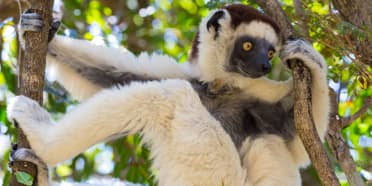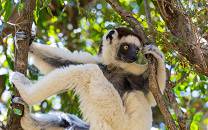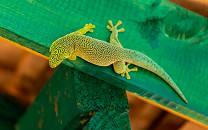- You are here:
- Home
- Countries & Parks
- Madagascar Parks
- Zombitse-Vohibasia National Park
Overview – Zombitse-Vohibasia NP

Anthony is a renowned Africa expert and author of many Lonely Planet guidebooks, including the guide to Madagascar.
Anthony is a renowned Africa expert and author of the Lonely Planet guide to Madagascar.
Anthony is the author of the Lonely Planet guide to Madagascar.
An island of forest in an ocean of cleared land, the often-overlooked Zombitse-Vohibasia National Park (Parc National Zombitse-Vohibasia) is a special and important place. It’s of particular interest to birders as the best place to see one of Madagascar’s rarest endemics, the Appert’s tetraka. It also has chameleons and lemurs. The park is also one of Madagascar’s most accessible, located along the Route Nationale 7 (RN7) between Isalo National Park and the southern beach town of Toliara (Tuléar).


Pros & Cons
- Excellent and important birding destination
- Unique habitat of transitional moist spiny forest
- Very accessible along the RN7
- Easy, flat hiking trails accessible from the main road
- No accommodations in the park and only one option outside the park
- Very short trails, mainly catering to birders
Zombitse-Vohibasia NP Safari Reviews
- Expert Rating
- Wildlife
- Scenery
- Bush Vibe
- Birding
- User Rating 0.0/5– 0 Reviews
- Wildlife
- Scenery
- Bush Vibe
- Birding
Wildlife
Lemurs to look out for during the daytime are the red-fronted brown lemur, Verreaux’s sifaka and ring-tailed lemur. There are five lemurs that are active at night, but they are rarely seen because night walks are not permitted. However, the Hubbard’s sportive lemur can sometimes be seen during the day, resting in the fork of a tree. There are lots of reptiles as well, and of particular interest is the locally endemic Standing’s day gecko.
Birds
Despite covering quite a small area, Zombitse-Vohibasia has a remarkable 72 recorded species, and many of the guides who wait at the trailheads are accomplished birders. The park may be the only place on earth where you can see the Appert’s tetraka (formerly known as the Appert’s greenbul). Other highlights include the giant and Coquerel’s coua, white-browed owl, lesser vasa parrot and blue vanga.
Scenery
Surrounded by vast plains of cleared land, the park is an oasis of green and protects three pockets of transitional moist spiny forest. There are several baobab trees to be seen on the trails, as well as some impressive strangler figs. During the Wet season (November to March), you might also see blooming orchids, including the very localized Spectacular grammangis.
Activities
The only activities in Zombitse-Vohibasia are bird watching and wildlife viewing while hiking along one of the park’s three short trails. Conveniently, the RN7 between Isalo and Toliara (Tuléar) passes right through the park, and all three trails begin by the roadside. Guides wait at the trailheads. Two very short trails cater primarily to birders, while the longest trail (3km/2mi) is best for spotting lemurs and chameleons.
Weather & Climate
Zombitse-Vohibasia occupies a transitional zone between dry and wet forests. It rarely rains during the Dry season (April to October), when the average daytime temperature is around 28°C/82°F. The Wet season (November to March) is hotter and has more rain, although it’s rarely enough to disrupt your visit. The average daytime temperature during these months is about 32°C/90°F. Nighttime is considerably cooler at around 17°C/63°F.
Best Time To Visit
Zombitse-Vohibasia’s best weather is generally during the Dry season (April to October). However, most visitors come to see the birds, which are at their most vocal and easiest to spot during the wetter months. November to April is when migratory birds pass through the park. Reptiles and amphibians are more active during the Wet season (November to March) as well. December to February tends be hot and humid.
Getting There
Zombitse-Vohibasia straddles the Route Nationale 7 (RN7) between the coastal town of Toliara (Tuléar) and popular Isalo National Park. It can easily be visited en route between these two destinations. The distance from Toliara, which has the nearest airport, is 150km/93mi. Madagascar Airlines has scheduled flights to Toliara. The park is 90km/56mi from Isalo and its access town of Ranohira. Bird-watchers can stay overnight at Zombitse Ecolodge, the only nearby accommodations, to get to the gate early.
Health & Safety
Please read our malaria and vaccinations page for Madagascar and our general ‘Wildlife Viewing Safety Precautions’ for more info:
Want To Visit Zombitse-Vohibasia NP?
Zombitse-Vohibasia NP Safari Reviews
- Expert Rating
- Wildlife
- Scenery
- Bush Vibe
- Birding
- User Rating 0.0/5– 0 Reviews
- Wildlife
- Scenery
- Bush Vibe
- Birding
Most Helpful Expert Review

Anthony is a photographer and writer for travel magazines and Lonely Planet, including the guides to Kenya and Botswana & Namibia.
A Forest Oasis Rich in Birdlife
Surrounded on all sides by sweeping grasslands and cleared fields, Zombitse-Vohibasia is an oasis of protection for a surprising number of species. The park’s numbers are easy to state: 72 bird species and eight species of lemur call this...


 Madagascar Parks
Madagascar Parks
